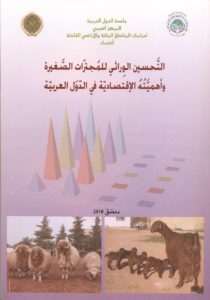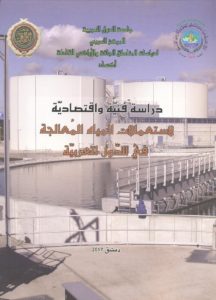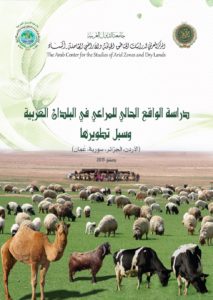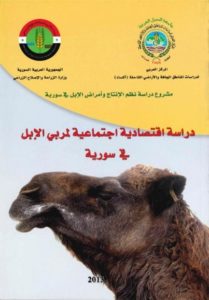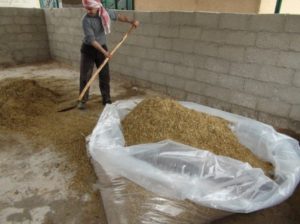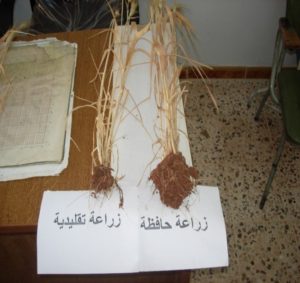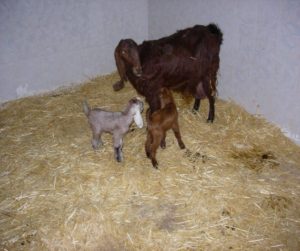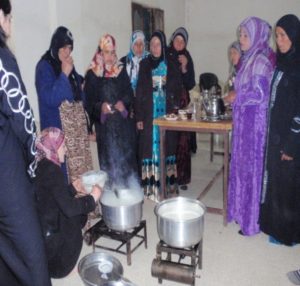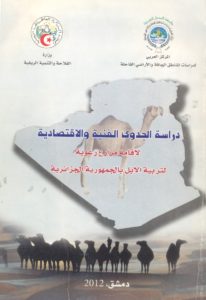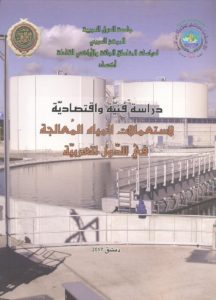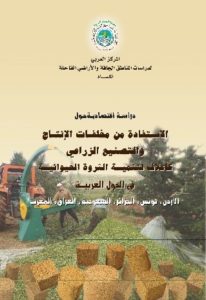Socio-Economic Studies
Small ruminant genetic improvement and its economic importance in Arab countries- 2018:
Objectives:
- Evaluate the results of the genetic improvement program in terms of breeding and economic aspects for Awassi sheep and Shami goats in the headquarters country (Syria).
- Conserve the improved animals of sheep and goats at the headquarters country’s stations, to be used as a core flock with excellent genetic traits (red meat and milk) by disseminating their pure genotypes or crossbreeding them with the local breeds in the Arab countries.
- Use modern techniques in the field of sheep and goat breeding, care and feeding to raise their productive performance in the Arab countries.
- Fill-up the food gap by improving the productive indicators (red meat and milk products) of local goat and sheep breeds in the Arab countries.
- Reduce animal product imports, provide foreign currency and achieve self-sufficiency of animal products in the Arab countries.
Technical and economic study on treated water uses in the Arab countries- 2017:
Objectives:
- Get acquainted with the water resources actuality and water problems in the Arab World.
- Get acquainted with the treated wastewater actuality in the Arab countries, and use this type of water as a non-conventional source for agricultural irrigation. This includes the following:
- The importance of treated water in comparison with the other available non-conventional water sources.
- Treated water properties and characteristics in some Arab countries.
- Uses of treated water, solid residues and sludge in Arab agriculture.
- Brackish wastewater treatment methods.
- Study economic and environmental aspects and irrigation efficiency by treated wastewater, in addition to the effect of this type of water on cultivated crop productivity.
Study on current actuality of rangelands in Arab countries and the appropriate development methods (Jordan, Algeria, Syria and Oman)- 2015:
Objectives:
The main objective of the study is to get acquainted with the current actuality of rangelands in Arab countries (Jordan, Algeria, Syr ia and Oman) and propose the practical solutions and methods for development. The sub-objectives can be identified as follows:
- Get acquainted with the countries’ development policies and projects in rangeland development.
- Get acquainted with the participatory approach in the pastoral areas.
Study on camel diseases and production systems in Syria, socio-economic study on camel breeders in Syria- 2013:
Objectives:
- Get acquainted with camel breeding knowhow in Syria by getting modern detailed data on camels and their productive capacities.
- Study prevailing production systems of animal manage ment and marketing, and suggest appropriate solutions for production development and improvement.
- Get acquainted with camel breeders’ social and economic activities in the study area.
Economic study on the use of agro-industry and production residues as fodders for livestock development in Syria- 2011:
Objectives:
- Get acquainted with the current situation of agricultural production residues (both plant and animal prod uction) and agro-industrial residues.
- Review the most important modern techniques for using and improving the nutritious value of agro-industrial residues.
- Evaluate economic, social and environmental impacts of modern methods and techniques in the field of agricultural residues use.
- Get acquainted with the future expectations of the use of these residues.
- Review the important recommendations and results of this study in front of the concerned authorities and decision makers.
Socio-economic study on the current actuality of the project area of “Degraded Rangeland Rehabilitation in Wadi Al-A’amarya- Al-Joaf Region- Saudi Arabia”- 2011:
Objectives: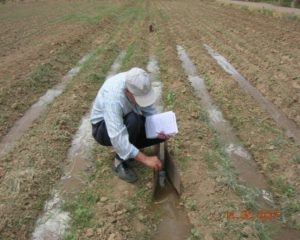
The main objective of the study is to get acquainted with the nature of the impacts that occurred as a result of rangeland degradation in Al-A’amarya region and the surrounded villages, particularly the economic and social impacts on population. Other objectives include the following:
- Study the available natural resources in the project area.
- Study the production and investment types.
- Get acquainted with the role of population and livestock breeders in the sustainability of the project, being one of the most important solutions for rangeland rehabilitation in the project area.
- Increase knowledge on population’s culture, education and health situations, and their impacts on rangeland sustainability and livestock production efficiency.
Annual economic report of conservation agriculture program for the agricultural season 2009/2010 in the farmers’ fields in the Syrian Arab Republic- 2011:
Objectives:
- Get acquainted with the differences in the production costs of both conservation and conve ntional agriculture types, which include operation costs, production input expenses, production costs/ha, differences in revenues and costs and differences in fuel consumption and time-saving hours.
- Transfer the promising positive results to the concerned authorities that can, in turn, communicate them to the cereal producers in the rainfed agriculture areas in the Syrian Arab Republic, or to other Arab countries in which this type of agriculture can prevail, as several experiments in the world confirmed that conservation agriculture can achieve a higher productivity at lesser costs in comparison to conventional agriculture.
Genetic improvement impact of crossbreeding between Shami goats and local goats on the economic and social situation of livestock breeders in the Hashemite Kingdome of Jordan- 2008:
Objectives:
This study aims basically to get acquainted with the genetic improvement impact of crossbreeding between Shami goats and local goats on the economic and social situation of goat breeders in Jordan. The sub-objectives of this study can be identified as follows:
- Give a sound idea on livestock in Jordan.
- Identify economic and social characteristics of goat breeders in the study area.
- Characterize goat breeding methods in Jordan.
- Identify economic and social genetic improvement impacts of crossbreeding between Shami goats and local goats on goat breeders in Jordan.
- Develop recommendations and proposals for future policies for goat breeding in Jordan.
Socio-economic study on “Idleb Rural Development Project- IRDP” in the Syrian Arab Republic- 2008:
Objectives:
- Describe household’s composition and income level.
- Identify main productive activities in the project area.
- Identify and describe household members’ activities.
- Characterize farmer’s activities, cultivated crop models and used techniques.
- Get acquainted with project beneficiaries’ basic expectations and priorities.
- Conclude some results and recommendations out of the study.
In the field of developing technical and economic feasibility studies for the pilot projects of ACSAD:
- The constant economic and social study development program has been implemented in the field of conservation agriculture in line with the applied field experiments at the farmers’ fields and research stations starting from the season 2009/2010.
- An economic and technical feasibility study was carried out for the establishment of an extension training factory for agricultural residue improvement and processing, 2012.
- The technical and economic feasibility study was prepared for the local poultry improvement project at Ezra’a research station, 2012.
- The technical and economic feasibility study was carried out for the establishment of pastoral farms for camel milk and meat production in Algeria, 2012.
- The necessary survey was carried out for the camel disease and production systems in Syria for the purpose of developing a research model for the rest of the Arab countries, and the necessary economic study was conducted, 2013.
- Prepare the questionnaire forms of conservation agriculture and livestock components and produce the socioeconomic study under the project of “Development Response for Controlling Poverty Resulted by Drought in the Northern-East Region of Syria” in cooperation with AAH, 2013-2014.
In the field of developing technical and economic feasibility studies for the investment projects of ACSAD:
The Department of Economy and Planning has developed, in cooperation with the other concerned departments, several project proposals to be presented to the Arab and regional funds for financing; these projects are the following:
-
Project of “Small Ruminant Genetic Improvement Importance for Facing Food Security Crisis in Arab Countries”.
- Project of “Wheat and Barley Variety Improvement and Dissemination in Arab Countries”.
- Project of “Agricultural Residue Use to Alleviate Fodder Shortage Crisis”.
- Project of “Non-Conventional Water Use in Agricultural Irrigation in Arab Countries”.
- Project of “Rainwater Harvesting and Supplementary Irrigation to Achieve Stability in Agricultural Productivity”.
